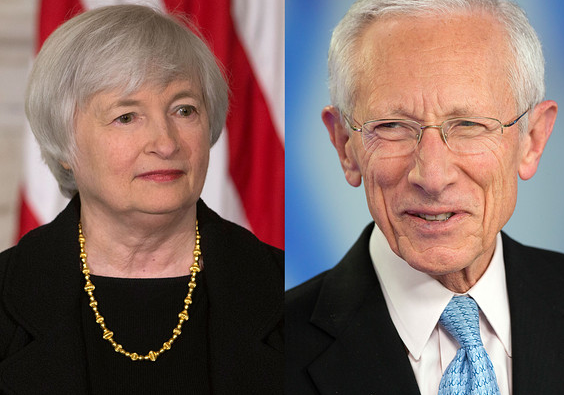Today’s AM fix was USD 1,311.00, EUR 982.76 and GBP 781.75 per ounce.
Yesterday’s AM fix was USD 1,308.25, EUR 977.33 and GBP 779.37 per ounce.
Gold fell $2.30 yesterday to $1,309.10/oz and silver rose $0.07 or 0.35% to $20.04/oz.
Gold popped higher today as equities fell on news that a Russian aid convoy is heading to Ukraine and on signs that the new deepening tensions and risk of conflict with Russia is hurting confidence in the euro zone economy.

Janet Yellen and Stanley Fischer
The Zew think tank in Germany reported a drop in investor confidence to its lowest level since 2012 due to the risk that economic sanctions pose to fragile economies. This helped push European shares and the euro lower, while boosting German bunds and gold.
Gold is marginally higher in London this morning after gold in Singapore fell to test $1,305/oz overnight again. Futures trading volume was 36% below the average for the past 100 days this morning as Wall Street remains on vacation.
Gold in U.S. Dollars - 1 Year (Thomson Reuters)
Spot gold was up 0.3% at $1,312.70/oz at 1230 GMT, while U.S. gold futures for December delivery were up $1.80/oz at $1,312.30.
Silver for immediate delivery rose 0.1% to $20.18 an ounce. Spot platinum was flat at $1,473.63 an ounce, while palladium edged closer to multi year nominal highs and was 0.5% higher at $882 an ounce.
Russia said a convoy of 280 trucks had left for Ukraine today carrying humanitarian aid. U.S., EU and NATO officials warned that the help may be a pretext for a Russian invasion.
Gold has climbed about 9% this year, mostly on geopolitical tensions between the West and Russia over Ukraine, and violence in the Middle East. Gold is seen as a safe haven investment to hedge riskier assets such as equities.
Many market participants are surprised that gold has not seen greater gains and is flat since February. Given the degree of geopolitical uncertainty and the fact that this uncertainty is likely to disappear anytime soon, gold should have seen greater gains.
U.S. Preparing Bank Bail-Ins - Fed Vice Chair Fischer
Federal Reserve Vice Chairman Stanley Fischer delivered his first speech on the U.S. and global economy in Stockholm, Sweden yesterday.
Fischer headed Israel’s central bank from 2005 through 2013 and is now number two at the Federal Reserve in the U.S. after Janet Yellen.
In a speech entitled, The Great Recession: Moving Ahead, given at an event sponsored by the Swedish Ministry of Finance, Fischer said that the economic recovery has been and remains “disappointing.”
“The recession that began in the United States in December 2007 ended in June 2009. But the Great Recession is a near-worldwide phenomenon, with the consequences of which many advanced economies--among them Sweden--continue to struggle. Its depth and breadth appear to have changed the economic environment in many ways and to have left the road ahead unclear.”
Speaking about the steps that have been taken internationally in order to “strengthen the financial system” and to reduce the “probability of future financial crisis,” Fischer said that the U.S. was preparing proposals for bank bail-ins for “systemically important banks.”
“Additional steps have been taken in some countries. For example, in the United States, capital ratios and liquidity buffers at the largest banks are up considerably, and their reliance on short-term wholesale funding has declined considerably. Work on the use of the resolution mechanisms set out in the Dodd-Frank Act, based on the principle of a single point of entry--though less advanced than the work on capital and liquidity ratios--holds the promise of making it possible to resolve banks in difficulty at no direct cost to the taxpayer.
As part of this approach, the United States is preparing a proposal to require systemically important banks to issue bail-inable long-term debt that will enable insolvent banks to recapitalize themselves in resolution without calling on government funding--this cushion is known as a "gone concern" buffer.”
Fischer’s comments that the U.S. is “preparing a proposal” for bail-ins is at odds with Federal Deposit Insurance Corporation (FDIC) and Bank of England officials who have said that bail-in legislation could be used today.
The U.S. already has in place plans for bail-ins in the event of banks failing. Indeed, the U.S. has conducted simulation exercises with the U.K. in 2013 and again this year.
On October 12 2013, Art Murton, the FDIC official in charge of planning for resolutions, and the Bank of England’s Deputy Governor Paul Tucker, both confirmed that the U.S. system is ready to handle a big-bank collapse.
The Bank of England’s Tucker, who has worked with U.S. regulators on the cross-border hurdles to taking down an international bank said that “U.S. authorities could do it today -- and I mean today.”
There is speculation that were Yellen to retire early Fischer would be anointed as the new Federal Reserve Chairman.
Fischer who previously was chief economist at the World Bank, also makes it clear that he expects ultra loose monetary policies to continue in the U.S. which will be bullish for gold and silver.
See our important guide to coming bail-ins here Protecting Your Savings in the Coming Bail-In Era
Recommended Content
Editors’ Picks

Gold refreshes all-time highs above $3,000 on escalating geopolitical tensions
Gold price is reneweing record highs beyond $3,000 early Tuesday on intensifying geopolitical Middle East tensions. Israel resumes military operations against Hamas in Gaza after the group rejected US proposals for extending ceasefire. Further US-Iran tensions add to the latest leg up in the safe-haven Gold.

AUD/USD trades with caution below 0.6400 amid MiIddle East tensions
AUD/USD has paused its upsurge, trading with caution in Tuesday's Asian trading. Traders prefer to stay on the sidelines amid intensifying geopolitical risks in the Middle East, reducing the appeal of the higher-yielding Aussie. Meanwhile, the US Dollar finds its feet due to risk aversion.

USD/JPY sits at two-week high near 149.50 as US Dollar finds demand
USD/JPY sits at two-week high near 149.50 in the Asian session on Tuesday as renewed Middle East geopolitical jitters revive the safe-haven demand for the US Dollar. However, further upside appears elusive amid divergent BoJ-Fed expectations and rising trade tensions.

Solana price faces 50-day resistance as SOL futures debut on CME Group with $5M volume on fifth anniversary
Solana stagnated around the $128 mark on Monday despite multiple bullish catalysts. The recent SOL unlocks by Alameda Research, ahead of FTX creditor repayments, have created a persistent bearish overhang since early March.

Five Fundamentals for the week: Fed leads central bank parade as uncertainty remains extreme Premium
Central bank bonanza – perhaps its is not as exciting as comments from the White House, but central banks still have sway. They have a chance to share insights about the impact of tariffs, especially when they come from the world's most powerful central bank, the Fed.

The Best brokers to trade EUR/USD
SPONSORED Discover the top brokers for trading EUR/USD in 2025. Our list features brokers with competitive spreads, fast execution, and powerful platforms. Whether you're a beginner or an expert, find the right partner to navigate the dynamic Forex market.
